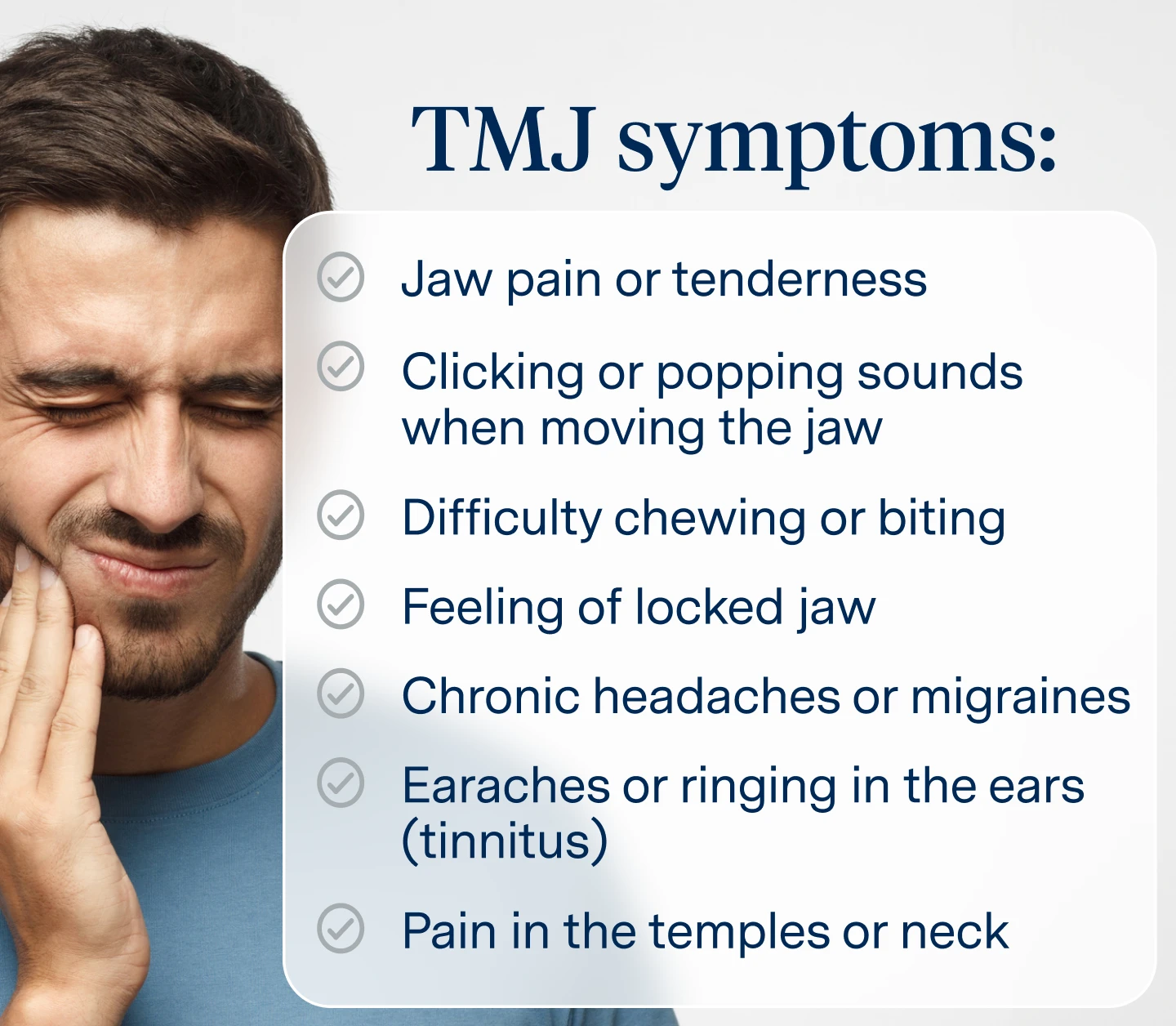TMJ
If your jaw pops, clicks or causes you pain, it could be a sign of Temporomandibular Joint dysfunction, or TMJ. The good news is, you don’t have to live with it. Contact your local Aspen Dental to learn about care options.
What is TMJ?
The temporomandibular joint (TMJ) is the hinge joint that connects your jawbone to your skull, enabling you to open and close your mouth. You have two TMJ joints—one on each side.
What causes TMJ?
✓ Jaw injury
✓ Teeth grinding (bruxism)
✓ Misalignment of teeth or jaw
✓ Arthritis
✓ Stress leading to muscle tension or jaw clenching
Temporomandibular Joint (TMJ) dysfunction
A TMJ disorder is caused when your temporomandibular joint becomes misaligned or stressed, leading to pain and discomfort in the jaw, face or neck. You may experience chronic headaches, earaches or difficulty opening and closing your mouth.
TMJ dysfunction diagnosis process
If you’re experiencing symptoms of TMJ disorder, you’re probably ready to find relief. A visit to your local Aspen Dental can determine a diagnosis and treatment to correct the problem. Here’s what you can expect during your visit:
Comprehensive TMJ evaluation
Your dentist will give you a full exam to determine the extent of your TMJ disorder. This includes assessing your jaw's movement, listening for clicking or popping sounds and discussing your symptoms. They may order imaging tests such as an X-ray, MRI or CT scan for further evaluation.
Personalized treatment
Like all Aspen Dental treatment plans, your TMJ treatment plan will be tailored to your specific needs. Depending on the severity of your condition, your dentist may recommend treatments such as:
✓ Lifestyle and dietary modifications
✓ Customized oral appliances (splints or night guards)
✓ Physical therapy exercises
✓ Medications for pain and inflammation
Education and support
At Aspen Dental, we believe in empowering our patients with knowledge. We'll educate you about TMJ and its causes and let you know how you can manage your symptoms on a daily basis. We're here to support you every step of the way.
Preventive care
We also emphasize preventive measures to help you maintain a healthy jaw. Our team will provide guidance on techniques and habits that can alleviate TMJ-related issues.
Guard against TMJ
Patients with TMJ (temporomandibular joint) disorders often receive an occlusal guard for treatment. This is commonly referred to as a night guard or bite splint, and helps to alleviate symptoms and prevent teeth grinding or clenching.
TMJ treatment options
TMJ treatment can vary based on the underlying causes and severity of symptoms. Possible treatments include:
✓ Over-the-counter medications for temporary pain relief
✓ TMJ night guards to prevent grinding your teeth while you sleep
✓ Physical therapy to improve your jaw flexibility and muscle strength
✓ Corticosteroid injections to relieve inflammation
✓ Surgical interventions for more severe cases, often as a last resort
✓ Neuromodulators, such as Botox, to reduce the power and size of jaw muscles
Temporomandibular Joint Dysfunction (TMD) self-care
TMD refers to a set of conditions that happen when TMJ becomes more severe, or when you experience excessive discomfort. You can manage all types of TMD with the following self-care strategies:Heat and cold therapy
Apply a warm compress for muscle relaxation and cold packs to reduce inflammation.
Soft diet
Choose easy-to-chew foods, and avoid anything tough or crunchy.
Jaw rest and exercises
During rest, limit activities that strain your jaw, like excessive talking, singing or gum chewing. When you have the energy, you can perform gentle jaw exercises to improve mobility and strength.
Stress reduction
Manage stress with relaxation techniques to prevent jaw tension.
Better sleep habits
To prevent teeth grinding, it’s best to sleep on your back and wear a custom night guard appliance. It’s important to wear your night guard every night (not just when your jaw hurts!) to ensure optimal results.
Posture awareness
Maintain good posture to reduce neck and jaw strain.
Over-the-counter pain relief
Ibuprofen and Tylenol may relieve discomfort.
TMJ exercises
Below are some TMJ exercises that may help improve TMJ pain and provide relief:
1. Jaw relaxation exercise
2. Resisted jaw opening
3. Jaw closing exercise
4. Side-to-side jaw movement
5. Tongue-to-roof exercise
TMJ FAQs
How do you cure TMJ permanently?
While there is no guaranteed permanent cure for TMJ, effective management often involves lifestyle changes, self-care and professional treatment options to alleviate symptoms and improve jaw health. Consult your Aspen Dental care team for personalized guidance tailored to your condition.
How long does TMJ last?
Some people may experience temporary discomfort that lasts a few weeks or months, others may have chronic TMJ issues that require ongoing management. Consult your Aspen Dental care team for a more accurate assessment of your condition.
What is a TMJ mouth guard?
A TMJ mouth guard, also known as an oral splint or night guard, is a dental device designed to alleviate the symptoms of TMJ. It helps by providing cushioning and support to reduce jaw clenching or teeth grinding, promoting relaxation of the jaw muscles and preventing further damage to the joint.
What is TMJ surgery?
TMJ surgery may be performed for severe cases of TMJ when conservative methods haven’t provided relief. It involves surgical procedures to repair or replace the jaw joint.
Discover more for your smile
Ease your TMJ pain
TMJ can have a major impact on your life, but there is hope in finding relief. Contact your local Aspen Dental today to learn more.

